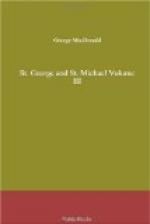‘Dost thou then count me honourable, Heywood?’ said Scudamore, in a voice of surprise, putting forth a thin white hand, and placing it on Richard’s where it lay huge and brown on the coverlid: ’Then honourable I will be.’
‘And, in that resolve, art, sir Rowland.’
‘I will be honourable,’ repeated Scudamore, angrily, with flushing cheek, and hard yet flashing eye, ’because thou thinkest me such, although my hate would, an’ it might, damn thee to lowest hell.’
‘Nay, but thou wilt be honourable for honour’s sake,’ said Richard. ’Bethink thee, when first we met, we were but boys: now are we men, and must put away boyish things.’
’Dost call it a boyish thing to be madly in love with the fairest and noblest and bravest mistress that ever trod the earth—though she be half a puritan, alack?’
‘She half a puritan!’ exclaimed Heywood. ’She hates the very wind of the word.’
’She may hate the word, but she is the thing. She hath read me such lessons as none but a puritan could.’
’Were they not then good lessons, that thou joinest with them a name hateful to thee?’
’Ay, truly—much too good for mortal like me—or thee either, Heywood. They are but hypocrites that pretend otherwise.’
‘Callest thou thy cousin a hypocrite?’
’No, by heaven! she is not. She is a woman, and it is easy for women to say prayers.’
‘I never rode into a fight but I said my prayer,’ returned Richard.
’None the less art thou a hypocrite. I should scorn to be for ever begging favours as thou. Dost think God heareth such prayers as thine?’
’Not if He be such as thou, sir Rowland, and not if he who prays be such as thou thinkest him. Prithee, what sort of prayer thinkest thou I pray ere I ride into the battle?’
’How should I know? My lord marquis would have had me say my prayers at such a time, but, good sooth! I always forgot. And if I had done it, where would have been the benefit thereof, so long as thou, who wast better used to the work, wast praying against me? I say it is a cowardly thing to go praying into the battle, and not take thy fair chance as other men do.’
’Then will I tell thee to what purpose I pray. But, first of all, I must confess to thee that I have had my doubts, not whether my side were more in the right than thine, but whether it were worth while to raise the sword even in such cause. Now, still when that doubt cometh, ever it taketh from my arm the strength, and going down into the very legs of my mare causeth that she goeth dull, although willing, into the battle. Moreover, I am no saint, and therefore cannot pray like a saint, but only like Richard Heywood, who hath got to do his duty, and is something puzzled. Therefore pray I thus, or to this effect:




